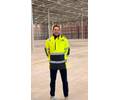Drug abuse in society and on ships is a well-known and growing threat. Recent major incidents on high profile ships (two deaths in 2014 on Maersk Alabama) have brought the issue firmly into the spotlight with many operators reviewing their policies and arrangements. Prevention is always better than cure and guidelines/regulations are well established requiring ship operators to randomly test crew for drugs.
The IMO Standards of Training, Certification & Watch keeping (STCW) 2010, Chapter VII, section B-VIII/1, 'Guidance regarding Fitness for duty', Prevention of drug and alcohol abuse, paragraph 7, states “Administrations should ensure that adequate measures are taken to prevent alcohol and drugs from impairing the ability of watch keeping personnel and those whose duties involve designated safety, prevention of pollution and security duties, and should establish screening programmes as necessary which identify drug and alcohol abuse, respect the dignity, privacy, confidentiality and fundamental legal rights of the individuals concerned and take into account relevant international guidelines.
The ILO/WHO Annex II "Guiding Principles on Drug and alcohol testing procedures for worldwide application in the maritime industry” states that when testing biological samples to detect the presence of certain drugs ...it is important that the procedures are thorough, tactful, discrete and maintain the individual’s right to privacy, medical confidentiality and ensure accuracy of the results with minimum inconvenience and distress to the individuals subject to the tests. Testing procedures which achieve these objectives should be developed.
USCG guidelines require minimum random annual testing of 50% of crew; immediate testing if there is reasonable cause to suspect drug use and testing of all crew within 32 hours after a serious marine incident (fatality; damage >$100k; discharge of oil or hazardous substance).
OCIMF recommends that “seafarers be subject to testing and screening for drugs and alcohol abuse by means of a combined programme of un-announced testing and routine medical examination.”
To fulfil these important obligations many ship operators use external private companies who offer a service where testers board ships annually in port to do highly intrusive and disruptive urine tests on crew. These services are expensive and very distracting during time alongside, just when ship operators least need distractions.
More importantly however, these services do not provide an effective deterrent to drug users who now know, that they only ever get tested when they dock. Drug users are well educated on how long drugs stay in their system, so they simply stop using drugs before ships come into port. So whilst operators may keep getting negative tests with this method of scheduled announced testing, ship's crew may be consistently and happily using drugs during passage. All the while operators are blissfully ignorant of the major danger lurking until disaster strikes.
Paul Luen, CEO of Martek commented, “It’s no co-incidence that the rate of positive tests rises sharply when testing moves from this scheduled and pre-announced regime to being truly random & un-announced. It would be foolish for any ship operator to think their ships were free from drugs, just because scheduled annual shore based testing, consistently yields negative tests!”
The UK is at the forefront of research into and prevention of drug use in the work place. Research reports* reveal some very concerning statistics on drug use in society such as at least one in thirty employees (UK) has drugs in their system at any point in time, there was a forty three percent increase in UK employees testing positive for drug use from 2007 to 2011 and with the price of drugs seeing a major fall in recent years and the emergence of many new 'legal highs', this percentage is expected to increase, as drugs continue to be an increasing problem in society.
There are over 1.5 million merchant seafarers worldwide. If the UK positive test rate was extrapolated to the marine industry, 50,000 seafarers would have drugs in their system at work right now; a truly shocking statistic.
Organisations that take the problem seriously and implement drug testing programmes, commonly observe decreased drug prevalence rates over several years, often exceeding 50%. A British manufacturing company, employing a workforce of several hundred, implement a testing programme as part of their drug and alcohol policy? In the early stages of the testing programme, the observed positivity rates exceeded 25%. 12 months following implementation, positivity rates decreased to 6% representing a decrease in drug prevalence of over 75%.
Employers also have a duty of care to provide a safe work environment, and an obligation to ensure that crew are not misusing substances that can impair their ability to carry out tasks safely.
"Random unannounced testing is the ONLY truly effective deterrent to drug use on ships and that’s why Martek Marine have introduced the DDS2 saliva test to revolutionise drug screening on ships." commented Luen, adding "DDS2 marks a massive breakthrough in technology and is the world’s first and only truly portable drug tester from saliva."
Developed by leading scientists out of Cambridge University, DDS2 now enables ship operators to instantly and without disruption, test anyone, anytime, anywhere. It makes disruptive, intrusive and expensive urine testing a thing of the past. With the cost per test working out at typically half that of using contractor urine test services, it also makes very strong commercial sense.
The system concurrently tests for up to 6 drugs including all the standard drugs of abuse: Amphetamine (AMP); Benzodiazepines (BZO); Cannabis (THC); Cocaine (COC); Methadone (MTD); Methamphetamine (MAMP) and Opiates (OPI). A total of 26 drug tests is currently available including for newer drugs such as SPICE, Ketamine and Mephedrone.
Each test takes around 2-3 minutes to administer with the donor using a swab stick to collect saliva - a clear colour change indicates the stick is ready for testing. The test stick is then simply inserted into the DDS2 instrument with a definitive test result read on the display in 5 minutes.
Martek claim the benefits of DDS2 compared to urine tests are massive. For the first time ever, it enables random un-announced self-testing without disruption, so ship operators can truly fulfil their obligations under IMO and USCG regulations. It detects drugs up to three times quicker than urine tests. This could be crucial to avoiding false negatives after a drug related incident or if an operator had cause for suspicion of drug use. It gives a definitive positive or negative result so there's no subjective interpretation of faint lines leading to uncertainty of the result as with urine test cups/strips.
Unlike urine testing, DDS2 saliva testing is immune from sample adulteration/tampering, giving much greater confidence and reliability of results. DDS2 tests are 100% specific to the target drugs so there's no possible cross interference like with some urine tests and as DDS2 is an electronic instrument with data logging, it automatically maintains a full record of up to 10,000 tests to easily and securely fulfil USCG reporting requirements.
For independent laboratory legal verification of positive tests, Martek provide a complimentary saliva test with full legal ‘Chain of custody’ procedure. DDS2 provides ship operators with 'The Ultimate Deterrent' to eradicate drug abuse on ships. Recently adopted by police and major employers worldwide (including Germany and the USA), it's reported to be having a massive impact on reducing 'drug driving' and drug use in the work place. Martek are certain it'll do the same on ships.
"In the next couple of years as DDS2 becomes the default standard method of drug testing on ships, operators will look back and wonder why other drug testing companies were 'taking the p*ss' with out-dated & ineffective urine testing in port." Mr Luen summed up.
Martek are formally launching the system at NOR Shipping in Oslo this week and offering the first 50 companies the opportunity to trial the system free for three months.
*High Society: Drug Prevalence in the UK Workplace. Concateno, July 2012



